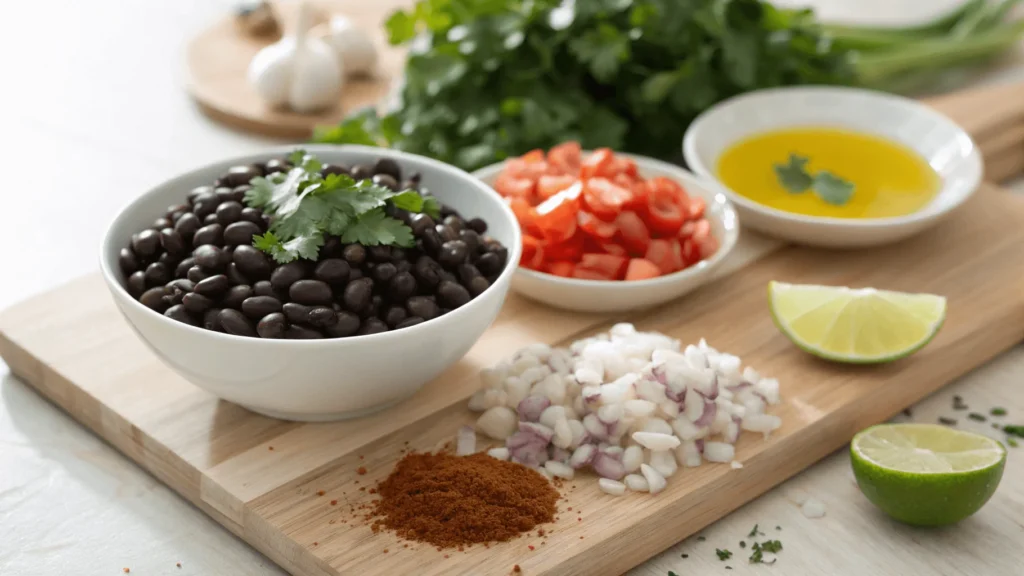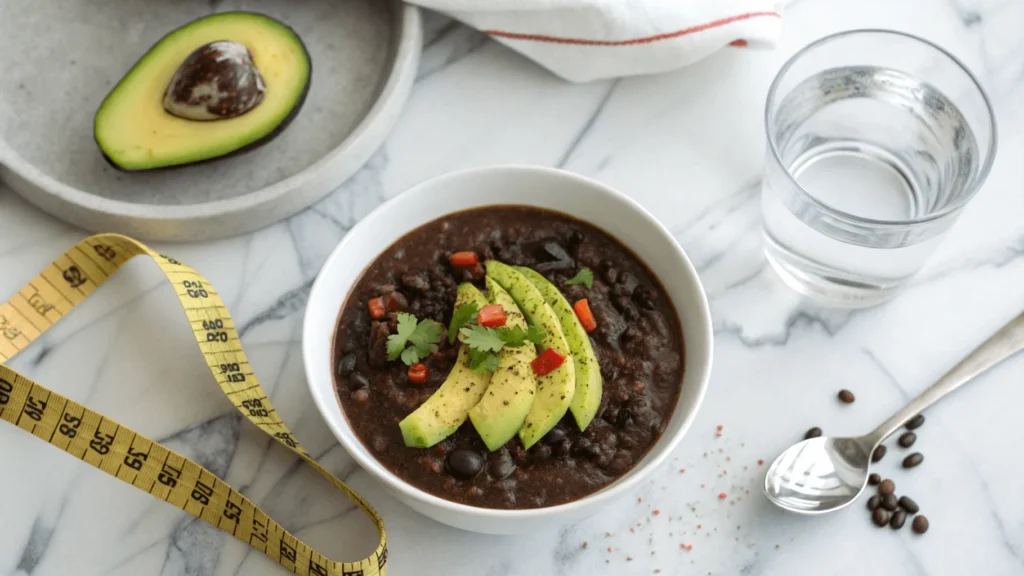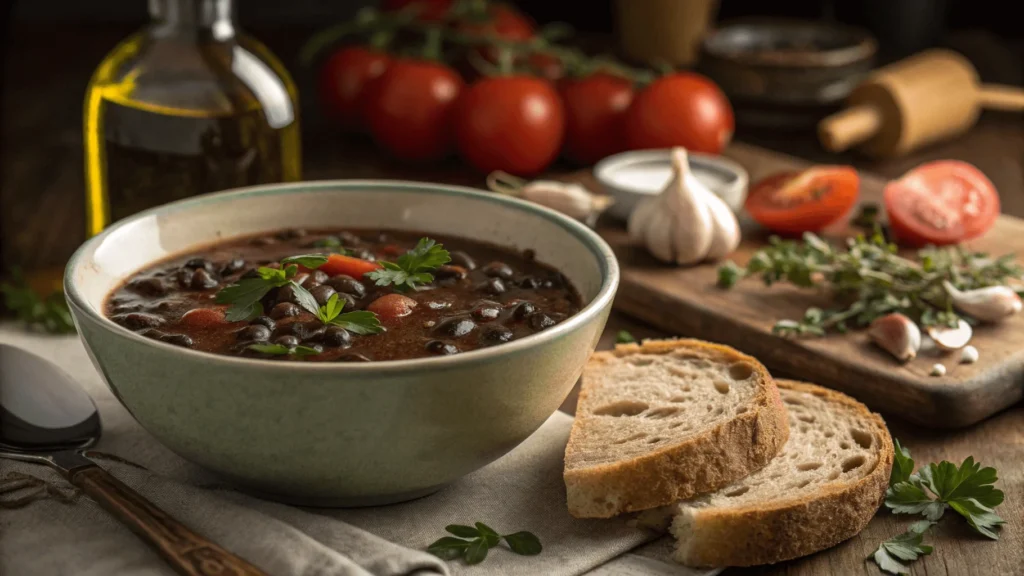this soup has been a staple in many cuisines worldwide, celebrated for its rich flavor, versatility, and impressive health benefits. But is black bean soup good for you? In this article, we’ll dive into the nutritional profile of this wholesome dish, explore its numerous health benefits, and even address some common concerns. From aiding weight management to promoting heart health, this soup offers a lot more than just comfort on a cold day. Whether you’re a fan of traditional recipes or looking to make your meals healthier, this guide has you covered.
Table of Contents
Nutritional Profile of Black Bean Soup

What Are the Primary Ingredients ?
Black bean soup typically consists of black beans, onions, garlic, tomatoes, and a variety of seasonings like cumin and chili powder. Some recipes include broth, lime juice, and optional toppings such as sour cream or avocado. These ingredients not only enhance the flavor but also contribute to the soup’s nutritional value. Learn more about the benefits of soaking black beans for better digestion and flavor.
Key Nutritional Benefits of Black Beans
Black beans are the star ingredient, offering a powerhouse of nutrients. They are rich in plant-based protein, making them an excellent choice for vegetarians and vegans. Additionally, black beans are packed with dietary fiber, iron, magnesium, and folate, all of which are essential for maintaining a healthy body.
Additional Nutrients From Common Soup Additions
The other ingredients in black bean soup add to its nutritional profile. Tomatoes provide vitamin C and antioxidants like lycopene, while garlic and onions offer anti-inflammatory properties. Broth can also be a source of minerals, depending on the type used. Together, these ingredients create a nutrient-dense dish that’s both satisfying and healthy.
Is Black Bean Soup Good for You? Health Benefits
Rich in Plant-Based Protein
One of the standout features of black bean soup is its high protein content. Black beans are an excellent source of plant-based protein, which helps build and repair tissues, maintain muscle mass, and support overall body function. If you’re curious about why black beans sometimes turn purple, it’s due to their high anthocyanin content, an antioxidant-rich compound.
Loaded With Dietary Fiber
Black beans are packed with dietary fiber, which is essential for digestive health. A single serving of black bean soup can provide a significant portion of your daily fiber needs. Fiber not only supports regular bowel movements but also helps lower cholesterol levels and regulate blood sugar. This makes this soup a heart-healthy and gut-friendly option.
Packed With Essential Vitamins and Minerals
In addition to protein and fiber, black bean soup is loaded with essential vitamins and minerals. Is black bean soup good for you? Absolutely! Black beans are a great source of folate, which is crucial for cell growth and development, especially during pregnancy. They also contain magnesium, which supports muscle and nerve function, and iron, which helps prevent anemia. The other ingredients, like tomatoes and garlic, bring in antioxidants and anti-inflammatory compounds that further boost the soup’s health benefits. This combination makes black bean soup not only delicious but also a nutrient powerhouse that contributes to overall health.
Low in Fat and Cholesterol-Free
For those watching their fat intake, is black bean soup good for you? This soup is a fantastic option. It’s naturally low in fat and contains no cholesterol, making it a heart-healthy choice. By using fresh ingredients and avoiding heavy creams or fatty toppings, you can keep your black bean soup light yet nourishing. This makes it an excellent addition to a balanced diet, allowing you to enjoy a flavorful meal without compromising your health goals.
Is Black Bean Soup Good for You? Weight Management
How Black Bean Soup Aids in Weight Loss
Black bean soup is an excellent addition to a weight-loss diet. Thanks to its high protein and fiber content, it promotes satiety, helping you feel full for longer periods. This can reduce overall calorie intake throughout the day, making it easier to achieve your weight-loss goals. For those interested in creative variations, try a purple black bean soup recipe for a colorful twist packed with nutrients.

Satiety and Calorie Density
The combination of protein and fiber in black bean soup makes it a low-calorie yet filling meal. Is black bean soup good for you? Definitely! Black beans have a low calorie-to-nutrient ratio, meaning you can enjoy a hearty serving without consuming excessive calories. This makes black bean soup an excellent choice for those looking to manage their weight without sacrificing flavor or satisfaction. Its satisfying nature allows you to feel full and content, making it a smart addition to any weight management plan.
Role of Fiber in Controlling Appetite
Fiber plays a crucial role in appetite control by slowing down digestion and maintaining steady blood sugar levels. Is black bean soup good for you? Absolutely! Black bean soup’s high fiber content can help curb cravings and prevent overeating, making it a smart option for those focused on healthy eating and weight management. By incorporating this nutritious soup into your diet, you can enjoy its benefits while supporting your overall health and wellness goals.
Is Black Bean Soup Good for You? Heart Health

Impact of Black Beans on Cholesterol Levels
This soup is a heart-healthy dish, primarily due to the cholesterol-lowering properties of black beans. Is black bean soup good for you? Yes! The soluble fiber in black beans binds to cholesterol in the digestive system, helping to remove it from the body. Regular consumption of this soup can contribute to lower LDL (bad) cholesterol levels, reducing the risk of heart disease. By incorporating black bean soup into your meals, you not only enjoy a delicious dish but also take a proactive step towards maintaining heart health.
Antioxidants and Cardiovascular Protection
Black beans are rich in antioxidants, including flavonoids and polyphenols, which protect the heart by reducing inflammation and oxidative stress. These compounds help prevent damage to blood vessels and improve overall cardiovascular health. Adding antioxidant-rich ingredients like tomatoes and garlic to your black bean soup further enhances its heart-protective properties.
Low Sodium Options for Heart Health
While this soup can be a healthy choice, it’s important to watch the sodium content, especially if you’re using canned beans or store-bought broth. Is black bean soup good for you? It can be, but opting for low-sodium or no-salt-added options can help keep your soup heart-healthy. You can also season with herbs and spices instead of salt to enhance the flavor without compromising your health. By making these mindful choices, you can enjoy all the benefits of black bean soup while maintaining a balanced and nutritious diet.
Is Black Bean Soup Good for You? Gut Health
How Fiber Supports Digestive Health
The high fiber content in black bean soup is a significant boon for digestive health. Is black bean soup good for you? Absolutely! Fiber plays a crucial role in regulating bowel movements, effectively preventing constipation and promoting a healthy gut environment. It adds bulk to the stool, making it easier to pass, which is essential for maintaining regularity.
Soluble fiber, in particular, is beneficial as it feeds the beneficial gut bacteria, supporting a balanced microbiome. This balance is important not just for digestion but also for overall health, as a healthy gut microbiome can influence everything from immune function to mental health. Incorporating black bean soup into your diet can therefore be a delicious way to support your digestive health and overall well-being.
Probiotics and Prebiotics
While black beans themselves act as a prebiotic, feeding healthy gut bacteria, many recipes for black bean soup include fermented ingredients like yogurt or sour cream as toppings. These additions can introduce probiotics—live beneficial bacteria that further enhance gut health. The combination of prebiotics and probiotics creates a synergistic effect, promoting overall digestive wellness. This dynamic duo helps maintain the gut lining, supports nutrient absorption, and can even help reduce the risk of gastrointestinal disorders.
Avoiding Digestive Discomfort
For some people, consuming black beans can lead to gas or bloating, largely due to their oligosaccharides, which are complex carbohydrates that can be harder to digest. Is black bean soup good for you? Yes, but to minimize this discomfort, it’s advisable to soak dried beans before cooking them, as this process can help break down some of the oligosaccharides.
Alternatively, opting for canned beans labeled as “low-gas” can also be a good choice. Additionally, incorporating spices like cumin or ginger into your soup can aid digestion and further reduce discomfort, as these spices have carminative properties that help soothe the digestive tract. By taking these steps, you can enjoy the many health benefits of black bean soup while minimizing any potential digestive issues, making it a delightful and nutritious addition to your meals.
Is Black Bean Soup Good for You? Blood Sugar Management
Low Glycemic Index of Black Beans
Black beans have a notably low glycemic index (GI), which means they cause a slower, steadier rise in blood sugar levels compared to high-carb foods. This characteristic makes black bean soup an excellent choice for individuals looking to manage their blood sugar effectively, particularly those with diabetes or prediabetes. The low GI of black beans helps in maintaining stable energy levels throughout the day, preventing the rapid fluctuations in blood sugar that can lead to cravings and fatigue.
Regulation of Blood Sugar Levels
The combination of protein, fiber, and complex carbohydrates in black bean soup plays a crucial role in stabilizing blood sugar levels. The high fiber content slows down the absorption of sugar into the bloodstream, which helps prevent spikes and crashes. This gradual release of glucose is essential for maintaining steady energy levels and avoiding the fatigue or irritability that can accompany sudden drops in blood sugar. Additionally, the protein present in the soup further contributes to this regulation, providing sustained energy and promoting feelings of fullness.
Benefits for Individuals With Diabetes
For individuals with diabetes, black bean soup can serve as a nutrient-dense, low-sugar meal option that aligns well with dietary needs. Its rich fiber and protein content not only help control blood sugar levels but also provide long-lasting energy, making it a satisfying and diabetes-friendly dish. Furthermore, the antioxidants found in black beans can help reduce inflammation, which is often a concern for those managing diabetes. Overall, incorporating black bean soup into a balanced diet can support blood sugar management while offering a delicious and hearty meal.
Potential Drawbacks of Black Bean Soup
Gas and Bloating From Legumes
While black bean soup offers numerous health benefits, it’s important to acknowledge that it’s not without its drawbacks. Some individuals may experience gas or bloating after consuming black beans, primarily due to their high fiber and oligosaccharide content. These oligosaccharides can be difficult for some people to digest, leading to discomfort. To help mitigate these effects, proper preparation of the beans is essential. Soaking dried beans for several hours before cooking and rinsing canned beans thoroughly can significantly reduce the oligosaccharide levels, making them easier on the digestive system. Additionally, gradually increasing fiber intake can help the body adjust and minimize gastrointestinal discomfort over time.
Sodium Content in Canned Black Beans
Canned black beans provide a convenient option for those looking to incorporate legumes into their diet, but they often come with added sodium, which can be problematic for individuals with high blood pressure or heart conditions. Excessive sodium intake can lead to fluid retention and increased blood pressure, so it’s crucial to be mindful of this when choosing canned products. Opting for low-sodium canned beans is a smart choice, as it allows you to enjoy the benefits of black beans without the added salt. Alternatively, cooking dried beans at home gives you complete control over the ingredients and sodium content, ensuring a healthier meal option.
Potential Allergies or Sensitivities
Although rare, some individuals may have allergies or sensitivities to legumes, including black beans. Symptoms can range from mild digestive discomfort to more severe allergic reactions. If you experience any adverse reactions, such as hives, swelling, or gastrointestinal distress after eating black bean soup, it’s best to consult a healthcare professional for guidance. They can help determine whether you have a sensitivity or allergy and provide recommendations for alternative protein sources that align with your dietary needs. Being aware of these potential issues allows you to enjoy black bean soup while prioritizing your health and well-being.
How to Make Black Bean Soup Healthier
Using Fresh Ingredients Over Canned
Using fresh, whole ingredients is one of the best ways to make this soup healthier. Opt for dried black beans instead of canned ones to avoid added sodium and preservatives. Fresh vegetables and homemade broth can also enhance the soup’s flavor while keeping it nutrient-dense.
Adding Superfoods and Nutrient Boosters
Elevate your black bean soup by incorporating superfoods like kale, spinach, or quinoa. These additions not only boost the nutritional profile but also add texture and flavor. A squeeze of lime or a sprinkle of fresh herbs like cilantro can also enhance the soup’s taste and health benefits.
Low-Sodium and Low-Fat Recipe Modifications
To keep your soup heart-healthy, use low-sodium broth and avoid adding heavy creams or fatty toppings. Instead, opt for Greek yogurt or avocado as healthier alternatives. These small changes can make a big difference in the overall nutritional value of your black bean soup.
FAQs
Is Black Bean Soup Good for Weight Loss?
Yes, black bean soup is an excellent choice for weight loss. Its high protein and fiber content promote satiety, helping you feel full longer and reducing overall calorie intake. The combination of these nutrients not only curbs hunger but also stabilizes blood sugar levels, which can prevent sudden cravings and unnecessary snacking throughout the day. Additionally, the low-calorie density of black bean soup means you can enjoy a generous serving without consuming excessive calories, making it a satisfying option for those looking to manage their weight effectively.
Can Black Bean Soup Be Eaten Daily?
Absolutely! Black bean soup can be eaten daily as part of a balanced diet. Its rich nutritional profile, which includes essential vitamins, minerals, and antioxidants, supports overall health and wellness. However, it’s important to vary your meals to ensure you’re getting a wide range of nutrients from different food sources. Incorporating a variety of vegetables, grains, and proteins alongside your black bean soup can help keep your diet diverse and enjoyable, while still allowing you to reap the health benefits of this wholesome dish.
Is Black Bean Soup Safe for People With Diabetes?
Yes, black bean soup is a great option for individuals with diabetes. Is black bean soup good for you? Its low glycemic index means it causes a slower, steadier rise in blood sugar levels compared to many high-carb foods. This characteristic, combined with its high fiber content, helps regulate blood sugar levels effectively. Additionally, the protein in black bean soup provides sustained energy, making it a filling meal that can help prevent spikes and crashes in blood sugar. Therefore, it serves as a nutrient-dense, low-sugar meal option that aligns well with the dietary needs of those managing diabetes.
What Are Some Popular Variations?
Popular variations of black bean soup include:
- Spicy Black Bean Soup: Made with jalapeños or other hot peppers for an added kick, perfect for those who enjoy a bit of heat in their meals.
- Creamy Black Bean Soup: Incorporating coconut milk for richness and a unique flavor profile, which can also add a touch of sweetness.
- Cuban-Style Black Bean Soup: Featuring orange zest and cumin, this variation offers a refreshing twist with citrus notes that brighten the dish.
- Vegetable-Loaded Black Bean Soup: Adding a variety of fresh vegetables like bell peppers, carrots, or spinach can enhance the nutritional value and add vibrant colors to the soup.
These variations maintain the core health benefits while offering different taste profiles, making black bean soup a versatile dish that can be enjoyed in many delightful ways.ferent taste profiles.
Conclusion
So, absolutely! Packed with plant-based protein, fiber, vitamins, and minerals, this dish is a nutrient-dense option that supports overall health. Is black bean soup good for you? From aiding in weight management and improving heart health to promoting gut health and regulating blood sugar levels, this humble soup offers a wide range of benefits. While it’s important to be mindful of potential drawbacks like gas or high sodium levels in canned beans, simple preparation adjustments can easily address these concerns.
Whether you’re looking for a comforting meal, a healthy addition to your diet, or a versatile dish to customize, black bean soup checks all the boxes. By using fresh ingredients, adding superfoods, and making heart-healthy modifications, you can enjoy this delicious soup as part of a balanced, wholesome lifestyle. So go ahead, grab a bowl, and reap the health benefits of this flavorful, satisfying dish!

